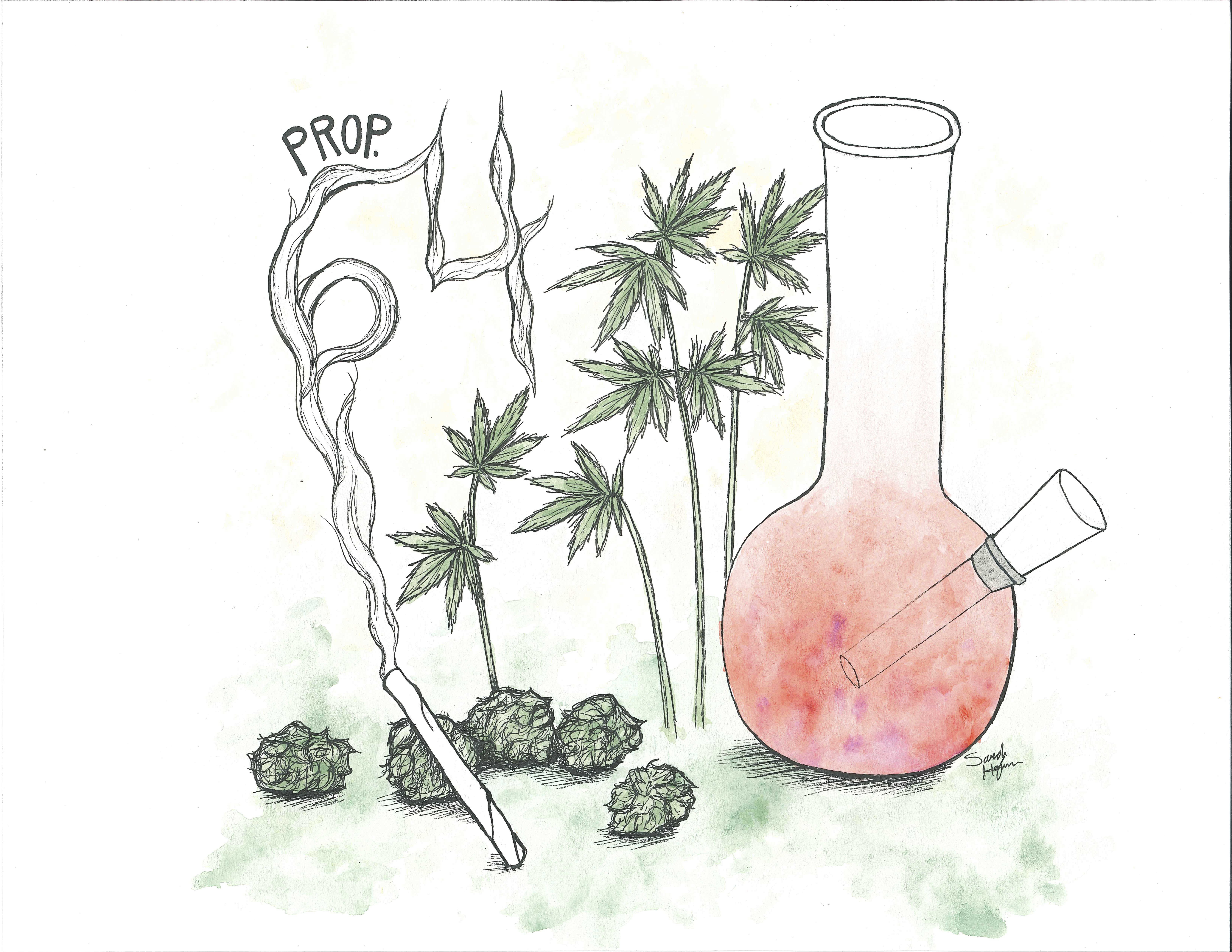California voters will have the chance to weigh in on 17 state propositions in the Nov. 8 California General Election, including Proposition 64 — the Adult Use of Marijuana Act —which would legalize the use of marijuana in California for adults 21 years of age or older, levy an estimated hundreds of millions of dollars in taxes on cultivation and sales, relieve the courts of an overabundance of non-violent marijuana related offenses and provide a stronger framework for regulating marijuana businesses. This proposition comes six years after the last vote to legalize marijuana, which was defeated 53.5 percent to 46.5 percent, according to the office of California Secretary of State Alex Padilla.
In the event of legalization, the policies regarding the use of marijuana at colleges and universities receiving federal funding would not change due to marijuana’s federal status as a Schedule I drug under the United States Controlled Substances Act, which President Nixon signed into law in 1970.
“[Occidental] College must comply with federal law, and if the state proposition passes our policy will still have to remain the same per the Drug-Free Schools and Communities Act,” Tom Wesley, assistant director for student conduct and housing services, said via email.
Therefore, institutions such as the University of Oregon and the University of Colorado Boulder, despite statewide legalization, prohibit the use or possession of both recreational and medical marijuana on campus, because neither are recognized under federal law. Currently, there is no plan in place to decriminalize marijuana on the federal level.
“With prohibition, a good is being sold on the black market, and that can introduce crime, [and] it can divert police resources away from where they’re needed; so I think legalization — bringing it out of the black market — is typically preferable to prohibition,” Dr. Andrew Jalil, assistant professor of economics, said. “I think in the case of marijuana, that’s probably where most economists would side.”
According to the website of the California secretary of state, most of the state tax revenue resulting from the passing of the proposition would go toward restoring lands that have been degraded by illegal marijuana cultivation, funding drug education programs for adolescents, subsidizing cannabis research and retraining law enforcement officers to approach the subject of marijuana with an emphasis on DUI enforcement.
The potential tax revenue — state and local — levied from such a popular commercial enterprise has added a game-changing economic facet to the marijuana legalization debate. Historically, the discussion focused on moral values; that is, the argument that use of any illegal drug must be banned on moralistic grounds.
“Even some of the ethical issues are a little bit tricky,” Jalil said. “On the one hand perhaps someone could argue that it’s not ethical to profit by increased tax revenue from selling marijuana to people. But on the other hand, [the current law] is a huge drain on police resources, on prison resources — it may lead to a lot of unnecessary arrests, and it leads to increased criminalization.”
The factors Jalil stated illustrate the uncertainty voters may face when deciding how to vote on this issue, which requires consideration of ethical, economic and medical factors.
Twenty-five states and the District of Columbia currently recognize marijuana as a medical product. The substance is commonly used to alleviate chronic pain and to help chemotherapy patients regain their appetites. Despite marijuana’s contributions to the field of medicine, there are many concerns about the drug. The health complications attributed to marijuana are discussed a great deal in the medical profession.
“The [number of] incidents of lung cancer is significantly higher in smokers of marijuana than in non-smokers,” Dr. Hans Geisse, an addiction medicine specialist at the Kaiser Permanente Riverside Medical Center, said regarding long-term marijuana use. “There are also issues with memory problems … and it can be so intense that people may be looked at as having dementia.”
One of Geisse’s concerns is that the number of marijuana related health problems may rise in the event of legalization, which would then lead to increases in health care costs. Notwithstanding these concerns, Geisse sees passage of Prop. 64 as potentially positive for the state.
“I think I’d be for legalizing it, but with the caveat that you really have to address the incidents or problems with the revenue you generate in order to made it cost neutral to the general public,” Geisse said.
Since 2012, four states — Colorado, Washington, Oregon and Alaska, whose populations total approximately 17 million — have legalized the use of recreational marijuana, according to statistics from the United States Census Bureau. If California becomes the fifth state to pass recreational marijuana laws, that number would rise to 56 million people — more than one sixth of the American population. If Arizona, Maine, Massachusetts and Nevada — the remaining states with marijuana legalization propositions on the ballot this election — pass their respective initiatives, the number of people with access would rise further to approximately 75 million.
Have a tip? Email us at weekly@oxy.edu or tweet us @OxyWeekly.
![]()




































